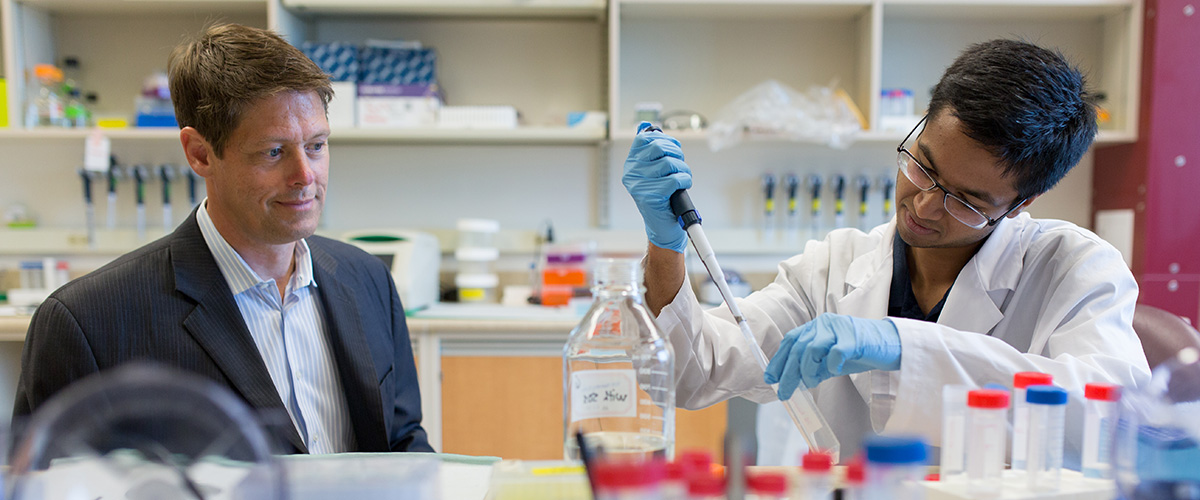Bird Dogs Chair in Translational Oncology funded by the Alberta Cancer Foundation

Project Overview
Prostate cancer is the most commonly diagnosed cancer in Canadian men. One in six Canadian men are affected by prostate cancer. Yet studies suggest that up to 50 per cent of men who are diagnosed with prostate cancer can live a full life without treatment.
Why should all men receive the same therapy, when the severity of the disease differs in each person?
This is just one of the questions being asked by experimental oncologist John Lewis, PhD, the Bird Dogs Chair in Translational Oncology funded by the Alberta Cancer Foundation in the Faculty of Medicine & Dentistry.
Thanks to the generosity by the late Frank Sojonky and a team of volunteers known as the Bird Dogs, this Chair supports research that will help us better understand and, ultimately, cure prostate cancer.
Finding a Cure That Sticks
John Lewis is focused on two related research goals: find a better way to detect and treat prostate cancer; and figure out how to stop cancer cells from spreading.
Traditional chemotherapies kill anything that's dividing in the body. Lewis, an associate professor in the department of oncology, leads a research team using cutting-edge nanotechnology and video microscopy to develop smarter, less toxic medicines and imaging agents that help detect the variation among individual patients.
The desired outcome is to ensure only patients who need aggressive treatment get it. "We are potentially over-treating men with prostate cancer," Lewis says.
The crucial distinction between the two groups - those who do and those who do not need aggressive treatment - is metastasis. "No man has ever died of prostate cancer that stayed in his prostate," says Lewis.
Using an antibody he calls "tumour glue," Lewis' team designed a way to stop cancer cells from leaving the tumour site. The antibody increases the stickiness of the tail of the cell and blocks the cells that want to move: "They can't get away," Lewis says. "They try to crawl but then snap back as if they're on an invisible leash."
The action of the tumour glue on the cells inhibits metastasis, and also serves as a biomarker that can predict if a patient's cancer cells are likely to spread in the future. Over the next five years, up to 10,000 Albertans will be enrolled in a diagnostic trial to test the biomarker. The long-term goal is to make it available as a simple blood or urine test.
The Bird Dogs Chair, held by Lewis, was created thanks to a group of people affected by prostate cancer who realized research was the only cure. Your donation will help expand the effort.
How to Help
Help make prostate cancer diagnosis and treatment more effective through a gift to the Bird Dogs Chair in Translational Oncology. Your donation will help to build a prostate cancer research team at UAlberta, and bring scientific discoveries to the clinic and the patient faster than ever before.
"When you give directly to research at a university, your money is going directly into something you can see, touch and feel," says the Bird Dogs fundraising chair, Roger Swainson. "You can see real progress being made, a sense of immediacy, and well-defined, achievable goals."
Giving Theme
Science
Ways to Give
Memorial/Tribute Gifts, Charitable Gift Annuities